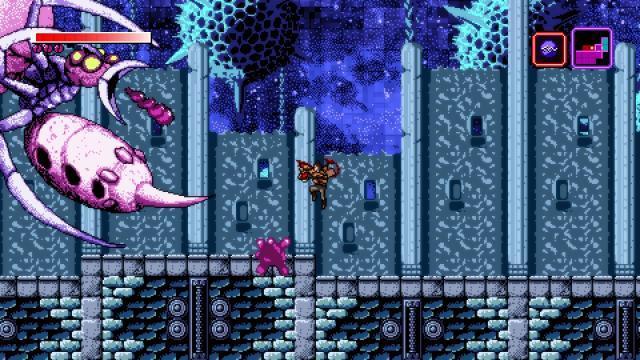Trace is in the world of video games, but he doesn’t know it. The color palette of this world, Sudra, is fiercely restrictive. Scanlines intrude the air at random. Dialog boxes hold the narrative. Audio is dirty, torn by vintage compression. He can even repair purposeful glitches (shared with the blow-on-the-contacts cartridge era) with a special gun. Axiom Verge traps Trace in its own homage of ’80s science fiction and of ’80s interactivity.
Axiom Verge is the work of one person – Tom Happ. Few other media formats allow for such a heavy production from a single perspective. Book writers require editors and publishers. Recording artists are at the whim of their labels, movies are helmed by hundreds. Axiom Verge credits but a single name.
As such, it’s fair to call Axiom Verge on its personality drought. It is so swarmed with Happ’s obsession regarding the roots of this genre, the clean breaths offered are few. Gameplay patterns steal from the behemoths – Super Metroid being the queen among them.
Paradox Retreat
Trace has no sensible disposition, no standout merit as a character. Swept safely and miraculously from a lab explosion, he moves through a dimensional boundary to Sudra and begins to shoot. He is fantastically athletic for a lab coat. Perseverance and unlikely survival aptitude keep him alive until answers begin to flow, but Axiom Verge has already caught up to itself. Stubborn writing and lean mythos appear, glaring at the Sudran’s obstinate religious society and speaking for the merits of science before unraveling. Interest in this supporting material fades rapidly. The mysteries are held too long.
The formula is gratingly simple and exploitative, yet when done right, masterful in the nearly invisible complexity. Axiom Verge is done right.
But, somewhere in the middle, the grip begins. Instinctive satisfaction from the thrill of exploration takes over. It’s a human feeling. We’re natural explorers. The genre knows this all too well and the best-designed entries are destined for exposure.
If shooters ping a primal need for violence, adventures soak in their ability assert themselves through constant revelation: A specific skill opens that door, that ledge needs this item to be reached. The formula is gratingly simple and exploitative, yet when done right, masterful. Axiom Verge is done right.
Monsters explode in a flurry of gory mass
Axiom Verge – a title adept in wordplay – breaks from its perceptive low-bit aesthetic to shower screens in fluid body parts. Boss creatures don’t die; they burst in rapidly expanding agony and it becomes a pixel spectacle in motion, visual effects on a diminutive scale.
Much of Axiom Verge deals in misshapen, certainly alien creatures. Insects, mostly. Worms, wasps, beetles; Trace has morals regarding human fatalities, so these ubiquitous foreign beings are easier to slaughter without guilt. The blood is easier to digest too. Sudra is a world of the bio-mechanical, so this is not just worms: the big ones have guns stuck in their bones. Maybe an eye is a laser, or a creature’s weak point is shielded by surrounding metal plates.
It is easy (too much so) to read into Axiom Verge’s pixels as a nostalgia play, but their construction is well manicured. Axiom Verge, while borrowing the garbled platforms (and ground) from its predecessors, powders designs with texture and exquisitely inlays color. Radioactive teals and scowling reds signify the background’s changing styles and purpose. Sudra is a world of many unfamiliar landscapes.
Lost Traces
Axiom Verge is a shimmering tribute, blended together with clean artistry and splendid, help-free map design.
Maybe Axiom Verge should be more self-aware; a second writer may have noted this. A producer may have called for a showcase of originality. Either scenario would bolster its stock. Maybe Axiom Verge needed a specialized editor too, someone to weed out the growing roster of weapons since the majority are similarly useless filler content. Then, a studio head who would have groomed, cut, trimmed, and suggested changes. The market is fickle after all.
But no, Axiom Verge had none of those things.
That is not an apology or an excuse.
Axiom Verge is certainly plentiful in errors which a creative hive-mind may have sorted out. Its reliance on sentimentality is distractingly crude. The game is a shimmering tribute, blended together with clean artistry and splendid, help-free map design. It’s remarkable how effortlessly Axiom Verge lets someone explore, lets them find new things and lets them discover. Within that is a joy which Axiom Verge blissfully distributes, and ultimately, it is wonderful.







Published: Apr 6, 2015 08:19 am